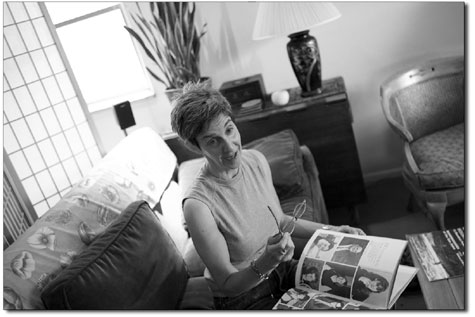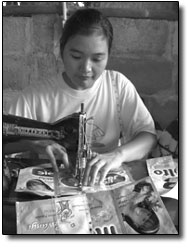| ||||
Wrapping activism in art
by Jules Masterjohn Artists give the world more than objects and experiences that stimulate our senses. Through artists’ eyes, we are offered new perspectives. Artistic investigation, like scientific inquiry, provides a depth and breadth of examination that leads to insight, altering the maker, the viewer and our communities. Artists the world over are utilizing the connective and transformative powers inherent in the creative process to move beyond the making of art for art’s sake. Many are using their problem-solving talents to address social and political issues toward the goal of positive change. Earlier this summer, one such artist’s effort was brought halfway around the world to inform our consciousness in Durango, via local ceramic artist Lisa Pedolsky. Pedolsky recently reconnected, after 30 years, with a high school acquaintance, Ann Wizer, who now lives in the Philippines. “Ann’s story is what’s right about the world,” Pedolsky told me as we admired her colorful laptop carrying bag made from recycled plastic pouches. Designed by Wizer and fabricated by some of the poorest people in Jakarta, Indonesia, the bag is one of many produced by the nonprofit organization, XSProject Foundation, which Wizer established. “The bags are such a kick. They make me smile and serve such a great purpose. It’s incredible,” offers Pedolsky, “what a difference one person can make in changing the world … at least a small part of it.” She is referring to the project that Wizer began in 2002 by hiring 125 families from the “pemulung,” or community of trash pickers, in Jakarta to salvage nonrecyclable, flexible plastic product packages from area dumps. The waste was cleaned and sewn into reusable tote bags through partnerships with Indonesian nongovernmental organizations and cottage industries. This project, “XSBaggage,” was the first one initiated by Wizer. Her inspiration came after seeing the massive amounts of trash on the streets while walking near her art studio. Having lived in the “tidy” country of Japan for seven years prior to relocating, she was shocked by the debris in the new neighborhood. In its first year, the XSProject was paying livable wages to underprivileged Indonesians, helping to reduce the amount of plastic product waste that made its way into Indonesian streams, streets and landfills, and introducing educational and recycling programs into the Jakarta schools. Though funded primarily by Wizer, she was excited by these successes and visualized a bigger impact. “I contacted the product manufacturers asking for their support to develop these pilot programs into large, sustainable recycling and educational, environmental-awareness programs.” By the end of 2004, Wizer had taken her project proposals to more than 50 corporations that produce the nonrecyclable packaging that XSProject reuses. “I thought that the corporations who produced 80,000 tons of product packaging trash would happily fund the educational awareness programs for school kids. Isn’t that what corporate responsibility is? I was naïve,” she humbly admits.
By the end of 2004, Wizer had taken her project proposals to more than 50 corporations that produce the nonrecyclable packaging that XSProject reuses. “I thought that the corporations who produced 80,000 tons of product packaging trash would happily fund the educational awareness programs for school kids. Isn’t that what corporate responsibility is? I was naïve,” she humbly admits. Though she was not able to interest even one corporation in XSProject’s recycling and educational initiatives, she did get asked to design and manufacture 20,000 tote bags using a company’s unused product packages, for distribution by the company as promotional items. She also was threatened with a lawsuit for “profiteering” from the use of a corporation’s trademark, which appeared on the packaging that the trash pickers had scavenged from the dump. Wizer muses, “When does a trademark die?” Disgusted by the corporations’ tactics to silence her, Wizer took her angst into the studio and used it to create sculptural installations that tell the story of her two-plus years of interaction with “corporate social irresponsibility.” In 2005, the resulting work was displayed in a major exhibition, “soapopera,” shown in Jakarta. The artist chose to use – what else? – plastic product packaging and other detritus found in her environment, to create her art. In what seems like an exorcism of anger and an exercise in humor, “soapopera,” juxtaposes large-scale photographs with sculptural elements like executive armchairs, made from the colorful packaging waste. One ensemble, “How Can I Get Your Attention? 2005,” consists of a 2-by-3-foot close-up photograph of a pair of hearing aids, hanging on the wall near three golf bags completely fabricated from the familiar plastic trash. Panels of wall text, describing the XS story, accompanied the art. For the artist, “soapopera” was a culmination and a catharsis. “I had been doing this activist work, and it went nowhere. So I wrapped it in ‘art’ and tried to tell the story about corporate abuse. The exhibition was a document: I did this … they did that. It was, itself, a soap opera about how we live.” Wizer is now wiser and shifting gears. “I spent two years knocking on doors of people making the garbage, and I realized they think I’m not important – I’m just a little artist. Now I have started appealing to people who are already involved in environmental activism and to the people legislating the laws. I am looking for those who already get it, and I find people like Lisa (Pedolsky) who get it.” “Getting it” means action to Pedolsky, who informed local business owner, Laurie Dickson, about the XSProject Foundation’s work. In response, Dickson now carries a selection of tote bags, portfolio cases, wallets, lunch sacs and toiletry cases at her Eco Home Center in Durango. Dickson, because she “gets it,” will be donating 5 percent of the proceeds from the XS sales to the local nonprofits, San Juan Citizens Alliance and Fort Lewis College Environmental Center. Pedolsky has also nominated Ann Wizer and the XSProject Foundation for the well-known etown e-chievement award that “recognizes people around the country who’ve found positive solutions to challenges in their communities.” If Wizer is selected, thousands of radio listeners will hear about the foundation, and the Indonesian people it serves will, most likely, be positively affected. • For more information about the XSProject Foundation, visit www.xsprojectfoundation.org.
|
In this week's issue...
- May 15, 2025
- End of the trail
Despite tariff pause, Colorado bike company can’t hang on through supply chain chaos
- May 8, 2025
- Shared pain
Dismal trend highlights need to cut usage in Upper Basin, too
- April 24, 2025
- A tale of two bills
Nuclear gets all the hype, but optimizing infrastructure will have bigger impact



